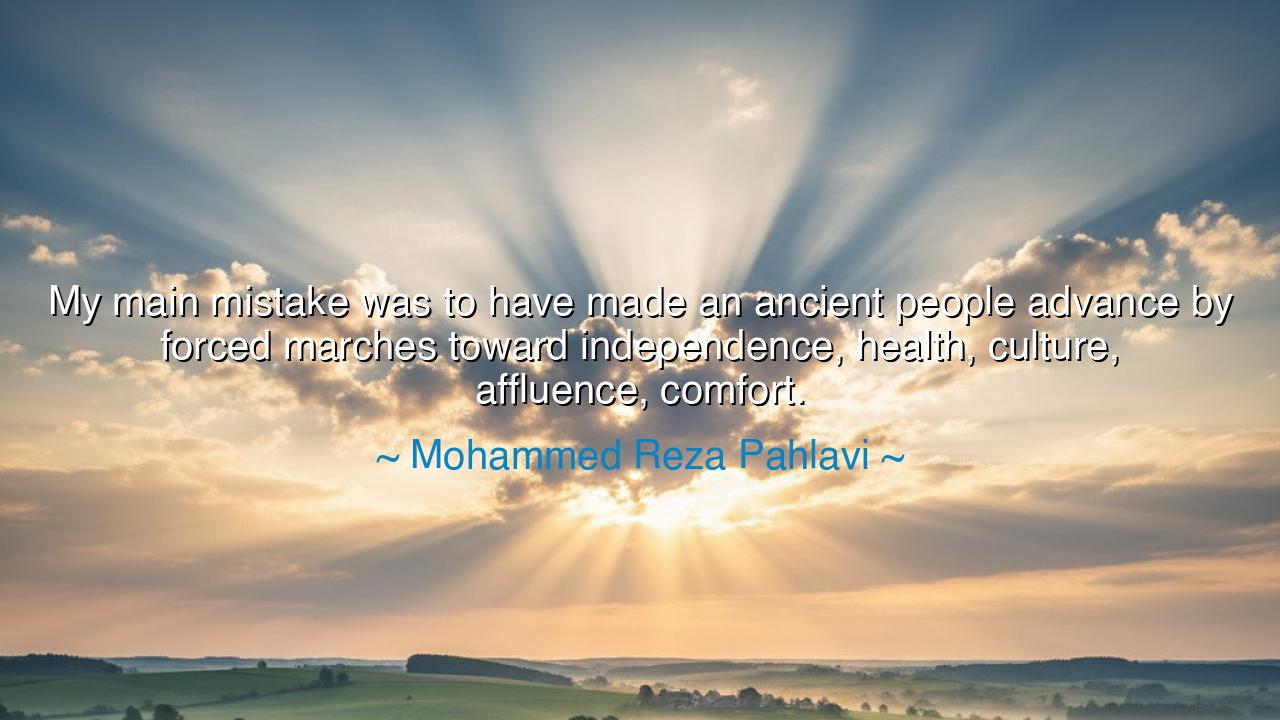
My main mistake was to have made an ancient people advance by
My main mistake was to have made an ancient people advance by forced marches toward independence, health, culture, affluence, comfort.






Here is a crafted response in the requested style:
In the words of Mohammed Reza Pahlavi, the last Shah of Iran, there echoes a lament older than empires: “My main mistake was to have made an ancient people advance by forced marches toward independence, health, culture, affluence, comfort.” This confession is not merely a reflection of political failure, but a whisper of human truth, a testimony to the limits of power when it dares to outpace the rhythm of the soul. The Shah, like a commander urging weary soldiers through storm and night, sought to pull a nation across centuries—from the tents of tradition into the glass towers of modernity. But in that haste, he discovered that no ruler, however determined, can force the flowering of civilization before the season has turned.
For the people he ruled were indeed ancient, their roots sunk deep into the soil of Persia, a land of poets and prophets, mystics and monarchs. To them, change was not to be commanded—it was to be courted, like spring courting the barren earth. The Shah’s White Revolution, with its rapid reforms in education, land, and industry, was meant to awaken the nation to new life. Yet, the old rhythms of prayer, family, and faith were torn from their place, and the heart of Iran, confused and divided, rebelled against the very freedom it was offered. Thus, progress became a wound rather than a healing, and comfort, once a promise, turned to exile.
There is an ancient tale that mirrors this truth—the story of King Akhenaten of Egypt, who sought to lead his people into a new faith, worshiping one god instead of many. He built shining temples to the sun and commanded his people to follow his vision. Yet when he died, the people destroyed his temples and restored the old gods, as though the king’s dream had been but a fever. Both Akhenaten and Pahlavi learned the same bitter lesson: the soul of a nation cannot be remade in a single generation, nor can faith or culture be decreed by law.
The Shah’s sorrow, then, was not born of defeat alone—it was born of misunderstanding the pace of destiny. He mistook the quickness of machines for the readiness of men. He measured civilization in roads and factories, but forgot that progress is not the paving of streets, but the illumination of hearts. In trying to deliver his people into the light, he blinded them with brilliance too sudden for their eyes. And when the storm of revolution came, it swept away not only his throne, but his dreams for the nation he loved.
Yet his words endure, not as the complaint of a fallen king, but as a warning to all who lead—teachers, parents, reformers, and rulers alike. The human spirit is not clay to be molded by command, but a flame that must be tended with patience and understanding. To demand too much, too soon, is to smother it; to wait too long is to let it die. Wisdom lies in walking beside time, not racing ahead of it.
For those who hear this teaching, let it kindle humility in your own journey. Do not seek to drag others toward your vision, no matter how noble it may seem. Guide them, yes—but let them walk at their own pace. Teach not by decree, but by example. Light your own lamp so brightly that others, seeing it, will find the courage to kindle theirs.
And remember this: true progress is not measured by wealth or comfort, but by harmony between past and future—by the gentle weaving of old wisdom with new light. Just as a river cannot rush without eroding its banks, neither can a people—or a soul—advance without roots. So, be the patient gardener of your time. Nurture, do not force. Inspire, do not command. For the seed that grows in its own season will endure the longest and bear the sweetest fruit.






AAdministratorAdministrator
Welcome, honored guests. Please leave a comment, we will respond soon